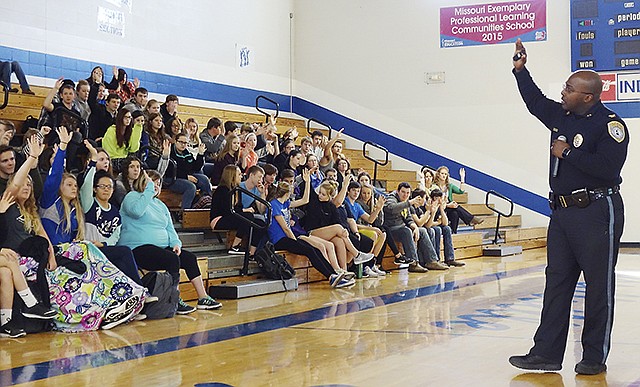RUSSELLVILLE - Equality should be the same for all, no matter your race, about 200 students were told Thursday as part of a Black History Month presentation at Russellville High School.
In his program on civil rights, Lincoln University Police Chief Gary Hill discussed how Jim Crow laws, which were in place from 1877-1950, were enforced by people who wore a uniform, like he does today.
"This is where the mistrust we see between citizens and law enforcement can be traced back to," he said. "Just because something is legal doesn't mean it is right."
Jim Crow laws were state and local laws enforcing racial segregation enacted after the Reconstruction period. Facilities for black Americans were inferior and underfunded compared to those available to white Americans, and sometimes they did not exist at all, he said. This body of law institutionalized a number of economic, educational and social disadvantages.
"I've taught at the police academy for many years, and I always ask who can tell me about Jim Crow laws. And in all my time there, I've only had three recruits who could tell me," Hill said. "The key is education. Never stop learning."
Hill said typically we hear about the efforts of people like Martin Luther King Jr., Jesse Jackson and other black leaders during this time, but he said there were many others, including white Americans, who should be acknowledged for their efforts to improve civil rights.
Hill talked about William Lewis Moore whose family and friends begged him not to go to Mississippi. His pastor told him he would get killed walking around with a sign protesting segregation. His family worried about where he would sleep and eat.
Even fellow civil rights activists told the Baltimore postal worker it was a bad idea to walk hundreds of miles through the heart of the South. However, Moore insisted on hand-delivering a letter to the governor of Mississippi,
urging the staunch segregationist to change.
Moore never made it to Jackson, Mississippi. He was shot to death on April 23, 1963, after crossing into Alabama.
"The most dangerous thing on earth is a motivated human being, wanting to change something," Hill said.
Hill told the students how he had talked with his great-great-grandfather who had seen many of the civil rights struggles from the 194os through the '60s.
"I asked him why the KKK wore masks and hoods, and he told me it was to scare people and to hide who they really were - such as doctors, lawyers and teachers," he said. "I couldn't believe it. Unfortunately, there is still a segment of society that believes in what they do."
Hill asked the students to shut their eyes. If all we had was the ability to talk and listen, he said, we couldn't tell the difference in race.
"We'd treat everyone as equals," he said.

